Psychological Impact of Sexual Assault on Gosia's Well-being
- 13 Pages
- Published On: 12-12-2023
Client Profile
Currently, Gosia is feeling anxious, and when her anxiety becomes unmanageable, especially in social situations, she feels like an outsider. Besides, she thinks people look down at her. Moreover, when she gets anxious, she has self-harmed, binge ate and made herself sick. Gosia stated that she started feeling anxious in her first year at university and when the first lot of exams started. She struggles with being in new environments and adapting. Her parents are very proud but have high expectations. Worse in big events, parties, she would like to go but finds it too overwhelming. She does not like events with strangers and often avoids them since she thinks she would not be excepted because she’s from Poland. Furthermore, she does not like strangers approaching her since she feels unsafe and only feels safe at home. In most instances, she stays alone at home and like reading books. During her leisure time, she rides her bicycle. During her childhood, she experienced sexual abuse and sometimes thought of self-harm. For students pursuing studies in this field, seeking psychology dissertation help can provide valuable insights into these intricate processes.
From the case scenario, the client has a history of sexual assault. Sexual assault has several potential consequences that can last a lifetime. Sexual assault leads to various adverse effects on individuals' health, employment, education, and economic well-being (Etzel et al., 2020). The study also reveals that sexual assault is linked to Post-traumatic stress disorder (PTSD), including severe anxiety, flashbacks, nightmares, and uncontrollable thoughts. This study explains the client’s exhibition of anxiety and being overwhelmed. According to Rapsey et al. (2019), victims of abuse also experience depression, including prolonged sadness, unexplained crying, and increased appetite leading to weight gain. Other conditions include conditions includes shock, fear, guilt, denial, withdrawal, isolation and grief. These symptoms are similar to that of Gosia, which reveal that her symptoms reveal a severe psychological impact on the client.
Therefore, it is critical for the therapy to consider the client culture, age, education, and country of origin. For example, it is vital to consider that the client is from Poland and living in a foreign land, thus might impact her feelings.

Session Context
In the session context, there was a good therapeutic relationship between the client and the therapist. A good relationship was used to create a strong bond between the client and the therapist. Additionally, it was created to ensure the success of counselling and psychotherapy. Also, it is evident that the client often lives lone life and struggles to make a relationship in the past; thus, the therapy aimed to allow her to explore their relational attachments, bonds, and experiences via a good relationship with the therapist. According to Kazantzis et al. (2017), creating a strong therapeutic relationship is vital in recovering a client since it enables an individual to develop trust. Similarly, the therapist chooses to create a good relationship since it has been proven to enable the client to open up emotionally and provide further details about themselves and issues that concern them (Kazantzis et al., 2017). Similarly, it helps the therapist understand the situation better, making it possible to provide the most appropriate treatment and employ the most effective strategies to address client challenges. Wiseman and Tishby (2017) state that when clients find it challenging to open up their experiences since they think they are not safe, it is important for a therapist to trust and feel confident that their therapist will not judge them.
Continue your exploration of Consequence Of Child Sexual Abuse with our related content.
Apart from the therapeutic relationship, there was also a professional and ethical concern. One of the concerns includes confidentiality and privacy of setting. This aspect includes keeping the secret of an individual. It is a vital concept since it makes counselling effective. Similarly, during the therapy, boundaries were considered (Vossler, 2021 cited in The Open University 2021). The boundary in consoling is vital in ensuring safety for both the client and the counsellor. Furthermore, to create an effective boundary, a professional client-therapist relationship was created, which is also ethics in counselling. This kind of relationship is always highly professional and never involve social or sexual context. Similarly, there was full respect for the client culture.
The theoretical framework used in the session is cognitive-behavioural therapy (CBT) (Carpenter et al., 2018). CBT play an active role in guiding through each counselling's session. The client has been having challenges after sexual assault and seems to have anxiety and fear. Therefore, from the theoretical framework, the client was helped via understanding the client distortions in thinking that are creating problems, getting a better understanding of the behaviour and motivation and solving the problem using the therapist problem-solving skills to enable her to cope with challenges and develop a greater sense of confidence in self and her abilities (Vossler, 2021 cited in The Open University 2021).
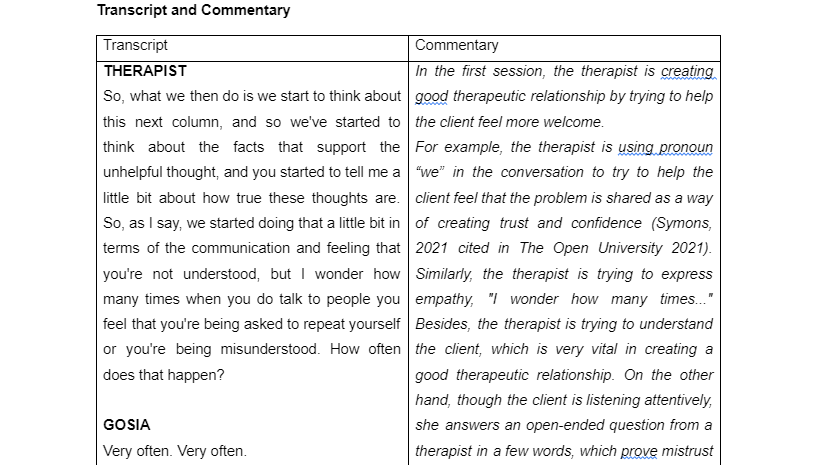
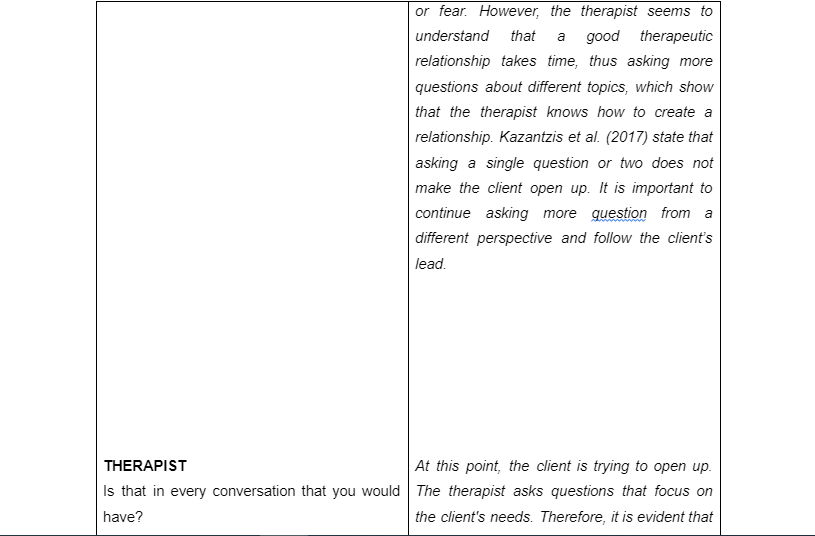

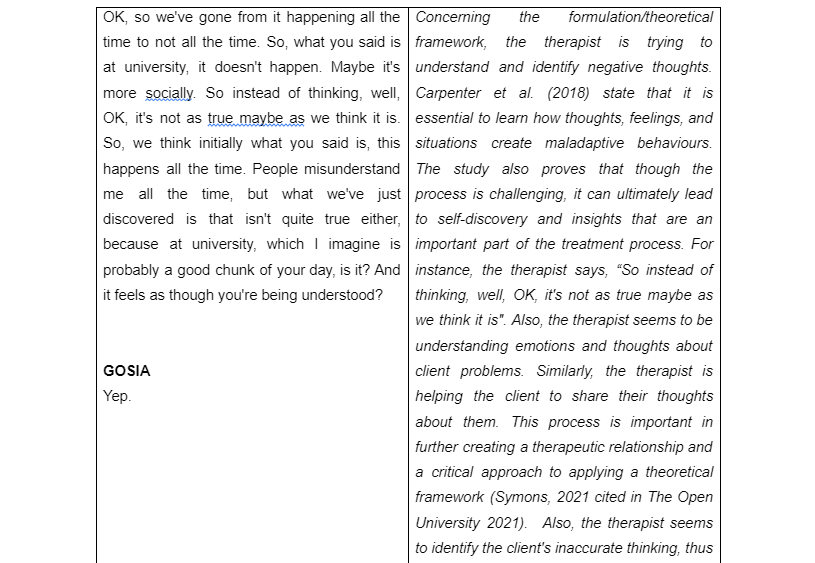
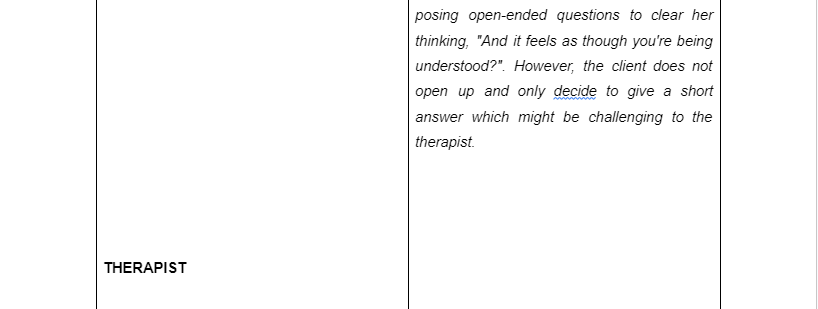



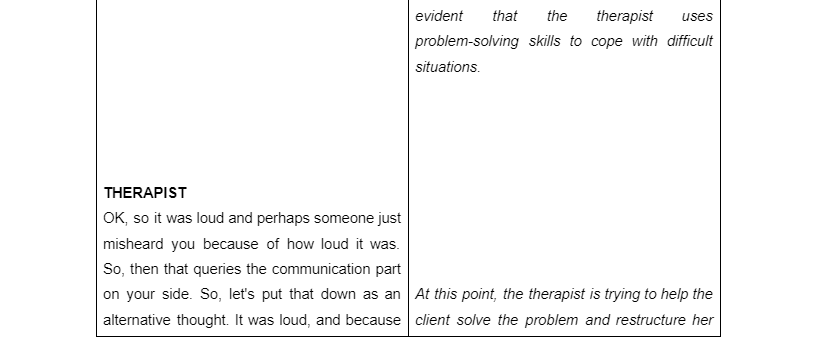

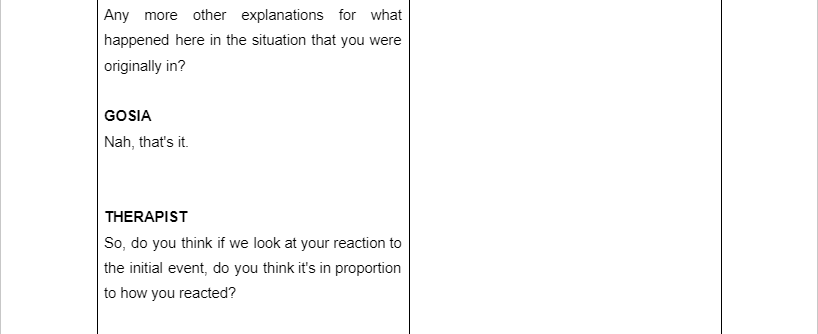

Alternative Format
Group therapy refers to a counselling form that involves a therapist working with several people at once. This strategy is helpful to Gosia since it can help her recognize that she is not alone, thus creating a sense of confidence and security. Similarly, she develops anxiety when in a social place. Therefore, the therapy can help instils hope when she realizes that people are also coping or recovering from similar circumstances. This strategy also offers a network of support when she finds an individual who has gone via similar circumstances and now has a different perspective. Similarly, it can be helpful since she can get extra support from people in the same situation. More importantly, it can help develop healthy coping skills and help her find her "voice." She has wished to live alone most of the times; thus, group therapy can help create voice in social events.
However, from the conversation, she did not want to open her problems in the first place. Therefore, group counselling might limit her ability to speak out. Also, she might lack confidence, thus ending up with unsolved problems. This therapy has also been revealed to make people uncomfortable (Paquin et al., 2021). Therefore, it might have made her unable to open her issues and retain her earlier though unsuccessful therapy. It violates privacy ethics and might create more rejection, especially when people learn of her group's problem. Therefore, though the therapy might be helpful, it can also lead to severe consequences.
Some of the factors that should be considered include universality. She has a specific condition that leads to her problem. Therefore, in group therapy, other members must have a similar issue and problem (Vossler, 2021 cited in The Open University 2021). Also, she believes that people do not like her. Therefore, another factor to consider is whether the therapy instils hope and group members are helpful. Besides, cohesiveness is very vital to create trust and a sense of belonging. Also, the therapy needs to provide self-understanding and give insight into own psychological motivation and underlying behaviour and emotional reactions.

Reflection
The scenario presents Gosia, who is feeling anxious and struggles to be in new environments and adapting. I have enjoyed describing the therapeutic relationship traits and drawing on concepts from this report's various therapeutic relationships. This process has increased my understanding of the better therapeutic relationship and its role in counselling; therefore, I have acquired vital knowledge in my career. Also, I was excited to consider professional and ethical issues applied in counselling and coming up with the most appropriate ethics and practice which are often applicable in various sessions. I was overwhelmed by linking therapeutic work and concepts learned in class, which increased my ability to apply the theoretical framework in practice. More importantly, I explained theoretical orientation (cognitive behaviour therapy) and concepts that are vital while working with clients. I have observed that working from a theoretical context can help individual active their goals easily. Therefore, I will prefer to work based on a certain theoretical framework to promote my outcome in the future.
Similarly, I was able to see therapist interventions and client reactions, enabling me to further my knowledge of physiological therapy. Also, I observed some possible difficulties and dilemmas experienced by the therapist, making me prepared while in the counselling session. Therefore, the report was a better training basis for my career.
References
- Carpenter, J.K., Andrews, L.A., Witcraft, S.M., Powers, M.B., Smits, J.A. and Hofmann, S.G., 2018. Cognitive behavioural therapy for anxiety and related disorders: A meta‐analysis of randomized placebo‐controlled trials. Depression and anxiety, 35(6), pp.502-514.
- Etzel, L., Hastings, W.J., Mattern, B.C., Oxford, M.L., Heim, C., Putnam, F.W., Noll, J.G. and Shalev, I., 2020. Intergenerational transmission of childhood trauma? Testing cellular aging in mothers exposed to sexual abuse and their children. Psychoneuroendocrinology, 120, p.104781.
- Kazantzis, N., Dattilio, F.M. and Dobson, K.S., 2017. The therapeutic relationship in cognitive-behavioural therapy: A clinician's guide. Guilford Publications.
- Naz, S., Gregory, R. and Bahu, M., 2019. Addressing issues of race, ethnicity and culture in CBT to support therapists and service managers to deliver culturally competent therapy and reduce inequalities in mental health provision for BAME service users. The Cognitive Behaviour Therapist, 12.
- Paquin, J.D., Abegunde, C., Hahn, A. and Fassinger, R.E., 2021. A brief history of group therapy as a field and the representation of women in its development. International Journal of Group Psychotherapy, 71(1), pp.13-80.
- Rapsey, C.M., Scott, K.M. and Patterson, T., 2019. Childhood sexual abuse, poly-victimization and internalizing disorders across adulthood and older age: Findings from a 25-year longitudinal study. Journal of affective disorders, 244, pp.171-179.
- The Open University, 2021. Beyond face to face: technology-based counselling
- Wiseman, H. and Tishby, O., 2017. Applying relationship anecdotes paradigm interviews to study client–therapist relationship narratives: Core conflictual relationship theme analyses. Psychotherapy Research, 27(3), pp.283-299.
Take a deeper dive into Psychodynamic Theory with our additional resources.
- 24/7 Customer Support
- 100% Customer Satisfaction
- No Privacy Violation
- Quick Services
- Subject Experts



